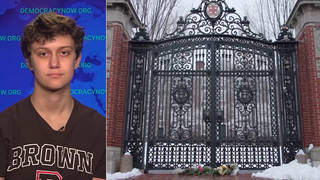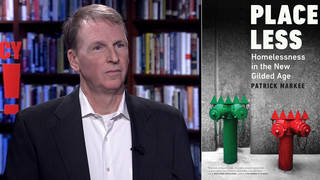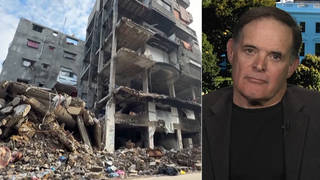
Guests
- Jan Egelandsecretary general of the Norwegian Refugee Council.
- Manuel RozentalColombian physician and activist, part of the group Pueblos en Camino, or People on the Path.
Eight years after the 2016 peace agreement in Colombia between government forces and guerrillas that was meant to end a half-century of conflict, around 5 million Colombians remain internally displaced and a growing number of people live in areas controlled by armed groups. The ongoing violence in the country has pushed many to flee, often by going through the treacherous Darién Gap between Colombia and neighboring Panama. For more on the security situation in Colombia and the state of the peace process, we speak with Jan Egeland, secretary general of the Norwegian Refugee Council, and Dr. Manuel Rozental, a Colombian physician and activist who is part of the group Pueblos en Camino, or People on the Path.
Transcript
AMY GOODMAN: This is Democracy Now!, democracynow.org, The War and Peace Report. I’m Amy Goodman, with Nermeen Shaikh.
NERMEEN SHAIKH: We’re continuing our conversation with Jan Egeland, the secretary general of the Norwegian Refugee Council. He’s joining us from Bogotá, Colombia, where he has been looking at how armed groups are increasing their control over sections of Colombia. According to the Norwegian Refugee Council, over 8 million Colombians live in areas where armed groups are operating. That’s a 70% increase from 2021. Around 5 million Colombians remain internally displaced eight years after the 2016 peace deal. The violence in Colombia has forced many people to flee the country, often by passing through the treacherous Darién Gap, which is located between Colombia and Panama.
AMY GOODMAN: In addition to Jan Egeland, we’re joined by Manuel Rozental. He’s a Colombian physician and activist with more than 40 years of involvement in grassroots political organizing with youth, Indigenous communities, and urban and rural social movements, has been exiled several times for his political activities. Rozental is part of the group Pueblos en Camino, or People on the Path.
Jan Egeland, let’s begin with you. Explain why the Norwegian Refugee Council, why you, as its head, are in Colombia right now.
JAN EGELAND: Because it’s one of the largest humanitarian crises on Earth, really, and it’s completely overlooked by the wider world, and it’s happening in the midst of the Western Hemisphere. I just came back late last night from a journey deep into the Nariño rainforest in the — this is the southwest corner of Colombia — and met there Indian tribes that are at the point of extermination because of the continued armed conflicts between eight — there are eight armed conflicts in Colombia between the many armed groups and also with the Army. And there are all sorts of drug cartels that are fueled by the drug trade. So are the many armed groups. And the civilian population is in the crossfire. So, I’m really shaken by seeing how many people are now completely unprotected in a widening armed conflict. Many of the unprotected, by the way, are also refugees, Venezuelans, migrants trekking north for protection and on their way, they hope, to North America.
NERMEEN SHAIKH: Jan Egeland, could you speak specifically about the impact of these multiple conflicts on the Amazon region? Deforestation in the Colombian Amazon has been surging, and some data suggests that deforestation in the region is 40% higher than it was last year, as a consequence of the conflicts in the area. So, if you could talk about the groups whom you spoke to there, the Indigenous groups, and why it is that the conflict is especially devastating in that region?
JAN EGELAND: It’s because there is no state. They call it ausencia de estado here, that there’s no state apparatus, no state services, no public force and order in large parts of Colombia, which is a beautiful country with enormous rainforests, mountains, pristine nature.
Some 80 Indigenous groups are really at the point of extermination. Their culture is gone, really, because they have been displaced by their land by these armed groups and the drug lords — often there is an overlap between them — for land, for the coca trade. There is an increase in narcotics production. And the narcotics is the fuel for the violence. And the civilian population, that is not protected, are displaced.
We are some humanitarian groups that are doing our very best to help. I went four hours with my colleagues in boat up the rivers to meet some of these Indigenous groups and the Afro-Colombian communities. And they are completely suffering alone. We can give them some humanitarian aid, but we can’t give them protection. And then we see that these people who have all the arms in the world are burning down the forest, displacing the people and working with complete impunity.
AMY GOODMAN: I want to bring Manuel Rozental into this conversation, the Colombian physician and activist, to talk about the root causes of the violence, Manuel, and to talk about what the government is doing. There are negotiations around ceasefires with armed factions, including the FARC. And how significant is U.S. involvement in any of this?
DR. MANUEL ROZENTAL: Thank you. Good morning. And it’s good to hear Jan Egeland’s voice. We remember him well here from his previous stay in Colombia.
Yes, one of the things I’d like to add to Mr. Egeland’s comments now is, yes, for sure, what he says is absolutely truth in terms of coca and the different armed factions, but one has to remember that when the peace agreement was signed between FARC and the Colombian government, even prior to this agreement that was signed in 2016, enormous oil extracting concessions were made to transnational corporations within the entire Amazon region. So, one has to add these factors to begin to explain what is going on.
I’ll give you an image of what Mr. Egeland is describing. Colombia is becoming a series, or could become, if it continues in this direction — it could become a series of autonomous criminal territories, huge territories, not only rural, but certainly rural, with the data that we’ve been provided already, but urban and rural. Armed factions, it doesn’t matter, they can portray themselves as right, left, involved drug trade, etc. — huge armed factions are linked to local mafias that are also connected to government positions and to the state. And these connections, these assemblies, are taking over territories and controlling populations, in a way such that, for example, if you see that there’s a decrease in the number of assassinations, kidnappings, etc., it usually means that these armed factions have gained control over the territories, and they have established a violent form of government and state.
So, there is an absence of a state that we could refer to as the ideal state that provides health, education, protection, etc. But there is a presence of a different kind of state being established in Colombia. And it is that way, and it can happen that way, on the background of extreme social inequalities, extreme poverty, that pushed people into two types of economies, illegal economies. One is surviving through what’s available, and that’s the coca, marijuana production. Colombia produces 92% of global cocaine and nearly as much of the marijuana. Ant then, the other type of economy is war itself. If you’re recruited, you receive some kind of income, or you make it. So, this is our state. There’s no absence of a state; this is the state in Colombia. And it’s linked to, in many cases and in many territories, linked to a form of government and state that traditionally has been engaged in these kinds of activities, so this combination.
Now, the U.S. involvement in this, I’ll just make one simple, small comment. And that comment is, General Laura Richardson, who is the Pentagon in charge of the U.S. South Command, has made it very clear that the interest in this region, the entire region, includes the Amazon and other territories for resources. So, it is the old imperial discourse in terms of a competition against the Chinese and the Russians for the control of these territories, and the main and only interest is extractive. The rest is just discourse. So, this is what we’re living through.
Amy, in fact, I was just remembering, as I was listening to Mr. Egeland, your book on Nigeria years ago. I’m in the northern Cauca. Mr. Egeland knows that what’s going on here is the same as in Nariño. And what we live through is what you described in Nigeria when you were stopped by armed people, and you weren’t killed, by miracle, because your life was in their hands. This is the power and the government and the state in Colombia. The rest is discourse and an image. It’s no different from what’s happening with Barbecue in Haiti, although in a different degree but with specificities.
NERMEEN SHAIKH: So, Manuel, if you could talk about the government of President Gustavo Petro and the policies that the government has had with respect to these multiple armed conflicts and the crisis that’s been unfolding, his policy of total peace, and what came of that?
DR. MANUEL ROZENTAL: The intentions of this government are excellent, and that’s why he received this massive support. And his initial proposal as a candidate was total peace, and that’s what he’s acting on. Total peace means negotiating with any and all armed actors. Some are political actors, or portray themselves to be political, and the armed insurgencies, and the other ones are criminal groups.
So, he offered a differential approach to each one of them. One would go and submit themselves to justice with favorable conditions in exchange for peace. The others would negotiate a political solution. After the peace agreement was signed in Colombia, not kept by the government, and led to not one armed faction, FARC, but many armed factions. So, in this context, Petro offers this process and begins to work on this.
The problem with President Petro’s proposal is twofold. One, it’s a repetition of the mistake made, I think intentionally, by President Santos, who is a Nobel laureate, which was a negotiation that excluded the population. It was a negotiation between the armed factions, on behalf of the people, to distribute the country and the country’s resources between them. And then, of course, that wasn’t kept by the governments that came back. Now Petro is doing the same. He’s negotiating with the armed factions. And the communities and populations who suffer these, as Mr. Egeland exposed, are being essentially ignored. So, that’s one mistake.
The second mistake — and it’s a huge mistake — is precisely in a discourse addressing the drug economy and the extractivist economy, but, in practice, not developing real, concrete, viable, feasible alternatives to this. And he is within a government that is actually under the control of a state that has become an authoritarian, mafia-type structure. So it couldn’t work. But the intentions are good. The discourse is good. But people are getting — feeling desperate on the ground.
NERMEEN SHAIKH: Well, we have Jan Egeland back now in studio in Bogotá. Jan Egeland, if you could continue what you were saying earlier and speak about your meetings with officials in Colombia?
JAN EGELAND: It is true that the government is trying to do a lot to bring peace and bring development to all of these vulnerable groups. But the point is that since the agreement in 2016, which brought so much hope, and the Nobel Prize to President Santos, as Manuel said, the FARC did demobilize, but then lots of other groups took their space, took the territory, took the drug trade, and there was no government to help bring an alternative, alternative development, alternate services to the people. So there was a vacuum, and that was filled by other armed men, and some of them are now back from the FARC. I will meet today — and the government needs, then, to do much more and work more effectively with the international community.
I will meet the diplomats here in Bogotá today, and I would say to them, “Listen, we have less funding today for development projects, for humanitarian relief, for support to Indian tribes at the point of extermination. There is less support for the alternative to war than there was before.” And it’s being ignored, that people are giving up hope in Venezuela next door, in large parts of Colombia, in Ecuador, in Central America and many other parts of the world. So, of course, people would be trekking north for hope and a better life in the north. If you don’t give people hope where they are and security where they are, of course they will wander north to the U.S., to Canada, to Mexico. I would do so in the same situation if there was no hope for me and my family or a better life and some protection against violence.
AMY GOODMAN: Jan Egeland, before you go, I wanted to ask you about another country, about Sudan, as the U.S.-led peace talks have begun in Geneva, Switzerland. There are conflicting reports on the state of the talks today. According to the BBC, neither the Sudanese army nor the Rapid Support Forces took part in this first day of talks. But there are reports that the RSF did send a negotiating team to Geneva, though it’s unclear if they showed up at the talks. Last week, you wrote on social media, “Sudan’s man-made mass-deaths must & can stop.” If you can respond to what’s happening in Geneva, and if you hold out any hope?
JAN EGELAND: We had high hopes for the Geneva talks, because the situation in Sudan is so desperate. It’s the first man-made famine on our watch for half a generation. In the Zamzam camp in northern Darfur, it’s half a million people there, and they are dying in masses because of starvation and because of blunt violence.
The talks is not really on at all, because the two sides do not seem to care for the people that they say they represent, which means there has to be much more pressure on the two sides in the Sudanese conflict. It’s a little bit like the Gaza situation that we also discussed. Neither Netanyahu nor Hamas have an interest in making peace. It’s very clear. So, the U.S., the West, the regional powers have to make much more pressure on the parties, just like the Gulf states, the neighbors to Sudan, and others have to make much more pressure on the two sides in Sudan so that they end this absolutely senseless war before the whole civilization in Sudan is torn to pieces.
AMY GOODMAN: Jan Egeland, we want to thank you for being with us, secretary general of the Norwegian Refugee Council, speaking to us from Bogotá, the capital of Colombia. We also want to thank Manuel Rozental, Colombian physician and activist, speaking to us from northern Cauca in Colombia.
Coming up, we look at Burma, where up to 200 Rohingya Muslims were recently killed in attacks as they attempted to flee to Bangladesh. We’ll get the latest. Stay with us.













Media Options